

However, some archaeologists and scientists worry about data sustainability, a new problem brought by the updating technology. Just because data has been recorded it does not mean it is safe.
Julian D. Richards, director of the University of York's archaeology data service in Britain, said digital data are preserved in such a vulnerable way that archaeological records are now, ironically, at greater risk than leaving the data in the ground.
"In 1986, the BBC Domesday project, including some photographs and maps, stored the data on 30-cm laserdiscs on BBC microcomputers, the safest way they could think of," he said. "By 2006 the laserdiscs were obsolete, so they had to start rescue projects for the data."
Hartmut Mueller, a co-organizer of the conference in Shaanxi and professor at Mainz University of Applied Sciences' Institute for Spatial Information and Surveying Technology, in Germany, said: "Collecting data in different systems without sufficiently considering the aspects of interoperability is the daily practice all around the globe. Not only in archaeology, but in all fields related to spatial data acquisition, processing and storage."
In Europe and elsewhere, there are many projects on how to achieve interoperability between heterogeneous systems, Mueller said.
Lu, of Zhejiang University, said that although Chinese archaeologists are applying for more digital documentation technologies, information is actually collected by different institutions, with different standards and formats.
"Information sharing could be a problem," he said.
In the past, Chinese archaeologists and scientists applied new technologies to archaeological sites without common standards, so their job was more like a "scientific experiment", which makes it difficult to standardize the data format, he said.
"While technologies become mature, it is possible for archaeologists to find a way to unify the methods for data collecting and the format of their data," Lu said.
Su Bomin, a researcher at the Conservation Institute of Dunhuang Academy, said some Chinese archaeologists are already aware of the problem of data security that comes with new technology.
"Unified management of data needs a standard, and the formulation of such a standard needs different research institutions to take part.
"As we Chinese archaeologists are already aware of these problems, I believe a standard will be completed soon," he said.
 |
 A letter to China's first space teacher
A letter to China's first space teacher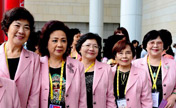 Taiwan guests attend 5th Straits Forum
Taiwan guests attend 5th Straits Forum Protesters stage anti-gov't rally in Bangkok
Protesters stage anti-gov't rally in Bangkok World Naked Bike Ride kicks off in Vancouver
World Naked Bike Ride kicks off in Vancouver Los Angeles' Chinatown sets up statue of Bruce Lee
Los Angeles' Chinatown sets up statue of Bruce Lee Touching moments of fathers with kids
Touching moments of fathers with kids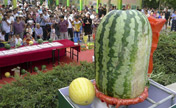 Watermelon weighing 50 kilograms takes the crown
Watermelon weighing 50 kilograms takes the crown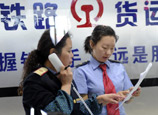 China Railway to push freight transport services
China Railway to push freight transport services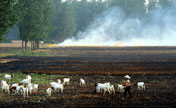 Farmers burn wheat stubble despite ban
Farmers burn wheat stubble despite ban  16th Shanghai Int'l Film Festival kicks off
16th Shanghai Int'l Film Festival kicks off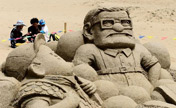 Sand sculptures at scenery spot of Qinghai Lake
Sand sculptures at scenery spot of Qinghai Lake 4th Int'l Festival of Intangible Cultural Heritage
4th Int'l Festival of Intangible Cultural Heritage Whole night queue for public kindergartens
Whole night queue for public kindergartens 24th China Harbin Int'l Economic & Trade Fair
24th China Harbin Int'l Economic & Trade Fair 1st direct int'l airline to Europe from NW China
1st direct int'l airline to Europe from NW China